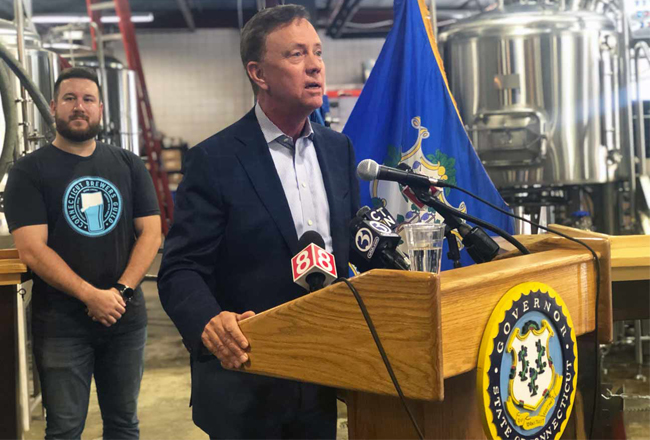New craft beer law ‘helps level the playing field’ for CT brewers, farmers

Gov. Ned Lamont has signed into law a measure that increases the amount of beer that craft breweries can sell daily to individual customers off-premises, from nine liters (about one case of 12-ounce cans) to nine gallons (about four cases of 12-ounce cans).
The governor signed the law at a June 24 ceremony at Tribus Beer Co., a craft brewery in Milford.
The legislation also contains several other provisions designed to support the growth of the state’s craft breweries, including:
- Consolidating the four beer manufacturer permits ”“ beer, brew pub, beer and brew pub, and farm brewery ”“ into one permit, helping to streamline the administration of these permits and level the playing field within the industry;
- Creating a Connecticut Craft Café permit, under which all manufacturing permit holders will have the ability to sell all other types of alcohol manufactured in the state. For example, wineries, cideries, and distilleries will be able to sell Connecticut craft beer, introducing state products to an even greater consumer population;
- Allowing craft breweries to hold multiple manufacturing permits so they can also make wine, cider, spirits and mead all under one roof.
It also contains other improvements that designed to support the liquor industry as a whole, including:
- Combining a number of permit types and streamline the fee structure so that there is far less confusion for small businesses looking to enter the marketplace;
- Increasing the number of gallons manufacturers of distilled spirits can sell annually from 25,000 to 50,000 gallons, and doubling the daily amount they can sell to individuals from 1.5 liters to 3 liters;
- Providing manufacturers and distributors more flexibility with how they provide products to package store retailers, allowing for more competitively priced products;
- Creating an out-of-state retailer shipper”™s permit so that consumers can buy wine from out-of-state for wine not available in Connecticut;
- Allowing manufacturers to designate ”“ with the approval of the Connecticut Department of Agriculture ”“ that their products are from a “Connecticut Farm Winery,” “Connecticut Farm Brewery” or “Connecticut Farm Cidery,” or that they are “Connecticut Grown” when meeting certain requirements.
“Consumers are continuing to show with their spending habits that they would much rather purchase locally manufactured beer and wine, and our outdated blue laws should not impede the ability of these small businesses to benefit from this growing demand,” Lamont said.
The law “helps level the playing field and supports Connecticut brewers and farmers. There”™s so many breweries and vineyards in Connecticut, and we should be doing everything we can to support them,” Lamont said.
A report released by the Connecticut Department of Labor last month showed that employment in the state”™s craft brewing industry, which includes microbreweries, brewpubs, regional craft breweries and contract brewing companies, soared from less than 15 in 2010 to nearly 800 in December 2018.